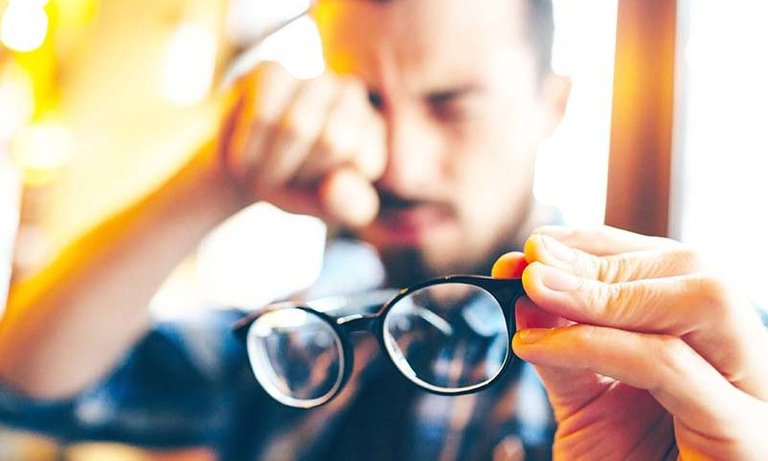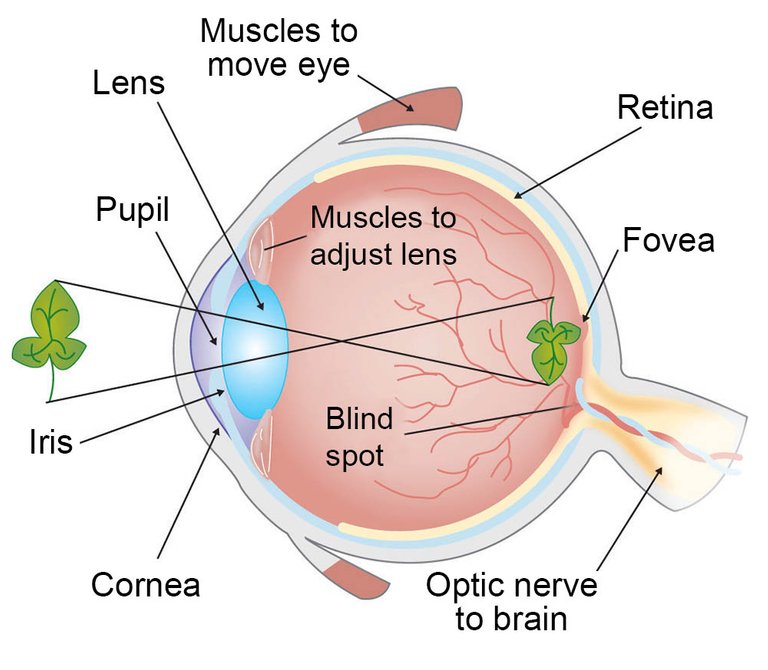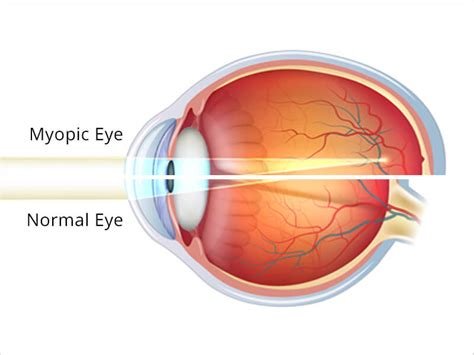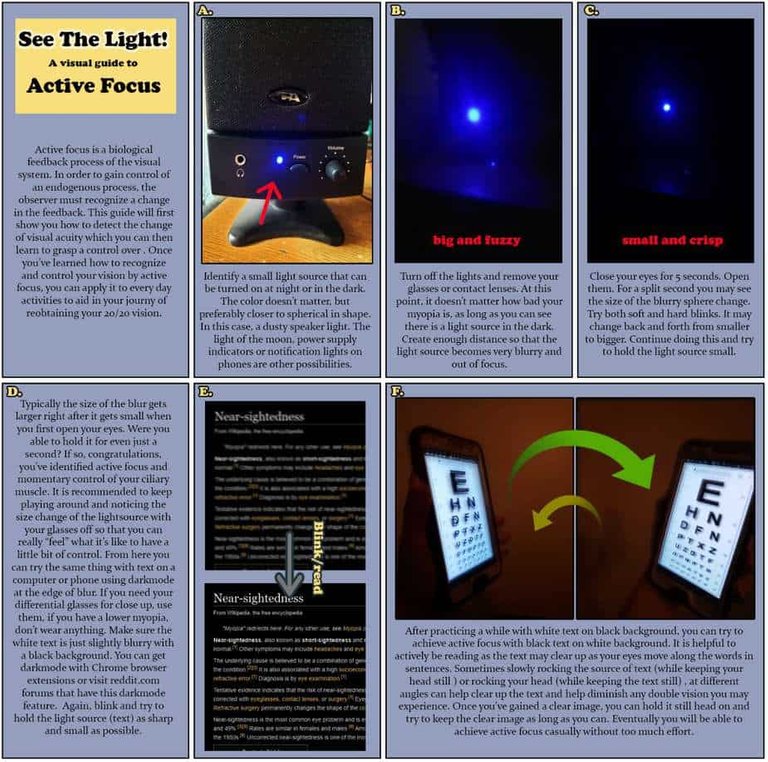If you've been wearing glasses for some time now, you've likely lost hope of any improvement: It seems like every time you visit the optometrist, your eyesight gets worse!
Before we continue, please note that I am not a doctor. I've gained this knowledge from reading. And so, may be wrong on some matters. Corrections via comments welcome!
Your eyes are doing their job
As with most muscles in your body, your eyes respond to stimulus, which in this case, is your vision.
Our eyes make small, subconscious adjustments when we look at something. This is done for one reason only: To adapt to your vision so things are clearer
When you focus intently at something close-up (like a phone) for some time, your eyes go "hey, let me adjust myself so I can see this phone clearer.
Making close-up objects clearer will also make far-away objects more blurry
A look at the eye
The muscles responsible for adjusting lenses and focusing on objects are called your ciliary muscles. You can actually feel them if you focus hard on something.
When you look at some thing far away, your ciliary muscles relax. When you look at something up-close, your ciliary muscles contract.
The elongation of the eye
After focusing on something close for a long time, your ciliary muscles get tired, just like your hands would if you clenched them for too long.
Here's the problem: Once your eyes "realize" that you'll be doing mostly close up activities, they elongate themselves so that the ciliary muscles don't need to contract to see nearby objects.
This is bad, now you need glasses to see far away objects!
You go to the doctor, and they give you lenses to make far away objects clear.
After a month of using the phone with those glasses on, you realize that they've somehow 'lost their power' and that you need a stronger prescription.
Behold, the cycle!
Your story is awful similar to the one above. Indeed, mine is too.
As you've probably guessed, your glasses are increasing your myopia instead of fixing it.
The eye adapts both ways
Think about it, your eye strains to see something nearby, it elongates itself.
The reverse is also true: If your ciliary muscles have to strain a slight bit to see something far away, it will shorten itself to make it easier for the muscle.
Why a slight bit? Well, if your muscles have to strain too much to see far away objects, they'll just give up; there goes your chance!
Steps to reverse myopia
0. Find a willing optometrist
You'll need an optometrist that's willing to help you, mostly with giving you custom-power lenses.
1. Have two glasses
Have two glasses: A and B.
- When reading or doing computer work, you don't need to wear full power lenses. If you do, you'll get more of that eye-elongation we saw a minute ago.
- Your close-up lens, ie. A should be the bare minimum you need to see things clearly. In fact, if it's possible to see clearly without glasses, ditch them.
- Your distance lens, ie. B should be slightly less† than the diagnosed power for your eyes. The rationale is simple: If your eyes have to strain very very slightly to see far away objects, they'll 'decide' that it's just easier to shorten your eyeballs.
- Don't go overboard with the number of glasses, two is the maximum. Otherwise you risk getting a headache from constantly changing focal planes.
† 'less' here is relative. If your current prescription > 3D, get a prescription that lower by 0.5D, else get one lower by 0.25D.
2. Rest your eyes
Constant close up without rest will lock up your ciliary muscles. This is called a ciliary spasm and is bad because it makes the next step useless.
Even if you follow all other steps correctly, you are not likely to see any gains if you don't rest your eyes enough.
I like to use Workrave to remind me to take a break. Set the short break reminder to 15 minutes and you're golden.
When on your break, look outside or anywhere that's further than 20 feet (6 metres) for 30 seconds. This will allow your ciliary muscles to relax after suffering under all that close-up strain.
3. Active focus
The concept of active focus can be best understood through Jake Steiner's write-ups.
Essentially, active focus is that point where an otherwise blurry object seems clear because of intent focusing. It's important you practice this regularly because it helps with shortening your eyeballs.
Wear your B glasses, go out and look at signs and license plates. They'll be slightly blurry; try to make them clear and hold it. This takes some time to master and if you're stuck, back to Jake's blog for tips!
4. Lighting plays an important role
Working in poor lighting is asking for bad eyesight. Harsh lighting has a bad rep for vision-induced headaches. Work in good lighting conditions such as sunlight from a window.
5. Nutrition
Vitamin A is very important for keeping your eyes healthy. Some vitamin A-rich foods are:
- Beef Liver — 713% DV per serving (1 slice)
- Lamb Liver — 236% DV per serving (1 slice)
- Sweet Potato (cooked) — 204% DV per serving (1 cup)
- Kale (cooked) — 98% DV per serving (1 cup)
- Carrot (cooked) — 44% DV per serving (1 medium carrot)
Eat these! (But don't overdo it on the livers)
Has it helped?
It sure has. It's been just under a year since me doing all the things above, the results have been fantastic: I've managed to reduce 0.75D from my right eye and 0.25D from my left.
If you're above forty...
This needs more evidence, but shining a deep red light into your eyes daily for 3 minutes can be good for your eyesight
Finally, if you're newly getting minus lenses...
Don't. Unless you are confident it's due to eye disease, getting glasses is guaranteed to screw your eyesight in the future.
You're likely experiencing a ciliary spasm, where your ciliary muscles get locked up because of a too much strain.
And so, I'd recommend keeping away books, computers and phones for some time, letting your eyes come back to their natural state. Ciliary spasms are NOT permanent and usually clear up in less than a week or two.
Myopia is not fun, and helping so many people fix what's probably their number one daily nuisance gives me a great deal of pleasure and pride.
Thanks for reading till the end!
— @rxge




Congratulations @rxge! You have completed the following achievement on the Hive blockchain and have been rewarded with new badge(s) :
You can view your badges on your board And compare to others on the Ranking
If you no longer want to receive notifications, reply to this comment with the word
STOPDo not miss the last post from @hivebuzz:
Solid read @rxge
Resteemed already. Upvote on the way :)
Great to hear, thanks!
I do not wear Glasses. This information is really worthy. @rxge thanks for your nice article.
It never hurts to be cautious - vision is probably the most important of all our senses, and keeping it safe should be our priority.
Thanks for reading!
Hello @rxge.
Your publication is very good. I have always thought that medicine in many aspects does not give convincing medical answers, for example if someone becomes diabetic it is because they are producing little or no insulin, but instead of treating the disease by stimulating the pancreas to produce insulin, What they do is they send the patient to inject insulin, and as many know if they inject insulin what it's doing is sending a response to the pancreas to stop injecting insulin because it's no longer needed because it's being injected from the outside, thus making the pancreas lazier.
In a similar way, as I understand from your post with our eyes, when they send us lenses they are making our eyes more lazy, they stop exercising to the point of becoming dependent on some lenses, and so on with many pathological things of our organism, but from my point of view this medicine is practiced in this way because it is under a capitalist and mercantilist vision that takes human health as a source of income to get rich.
Greetings and thanks for sharing, from so many posts I have read this one has fascinated me
Thanks @carlos84 for your kind words and wholesome comment. The eye conditions market is absolutely booming, as the cunning ones capitalize on making larger and larger profits, all at the expense of human welfare.
Thanks for reading till the end, I'm glad to have left an impression on you and hope to continue doing so in the future.
Hi dear @rxge.
I think all of us here will feel identified with this post. Surely all of us have some condition in our eyes.
The years in front of the screens surely left traces.
Yes Juan, it's our job to make sure these traces don't manifest into difficult-to-fix conditions.
Thanks for reading till the end!
Nice work!
this article reminds me that I have to buy glasses because I have a condition which makes me need to wear glasses :-( .
thanks for the nutrition tips
Glad to help, thanks for reading!
@tipu curate
Although I don’t use glasses, I read this post and can boldly say that it is valuable. Cheers!
Dear @rxge
Finally I've found some time to catch up and read few previously bookmarked posts.
Interesting choice of topic, I must admit.
Somehow my eyes got wattery while I was reading this post lol. I also wear glasses and I often wonder - how much longer will I be able to use them to work. When will I start having some real issues, since I sit in front of laptop day and night.
I've learned that looking at some green and looking away is apparently helping (best if you can combine both, just to sit down outside on the grass and look into far distance). Would you agree with it?
Have a great day buddy,
Piotr
Piotr!
I doubt it's the green grass that's helping.
Rather it's your looking into the distance that's allowing your ciliary muscles to 'unlock' themselves, resulting in clear vision.
I was expecting a comment from you. Now that it's here, I can sleep peacefully 😂
Thanks for reading!
An extraordinary article that you share with us in this opportunity, I have always considered that any type of information related to our health has an immense value for any person, and the health of our eyes is of great importance since through them we can observe and enjoy our environment.
As you explain in some opportunities we can feel the work of those small but important ciliary muscles which allow us a better focus of the light rays emitted by any body or object that we observe, this allows that these luminous rays are projected with greater intensity in our retina and thus to have a clearer image.
I am surprised that the consumption in adequate quantities of net liver allows us to provide vitamin A, to our eyes, in short a very nutritious contribution and of great interest to all, thank you for sharing this type of material with all of us. Successes.
Hello dear @rbalzan79.
You are on point about the work ciliary muscles do. And indeed, stressing your ciliary muscles is actually good for your myopic eyes.
Thanks for reading till the end
I am so glad to read this, I have a friend who has been complaining about his eyes for some time now and we plan to visit the eye clinic soon, I will share this with him as well.
Hey @rxge
Do you recommend to do this with glasses on or without glasses?
Would you wear glasses when walking outside or not?
Would be great if you could answer me.
The 0.75D you managed to reduce are great i hope i can achieve the same.
Best regards